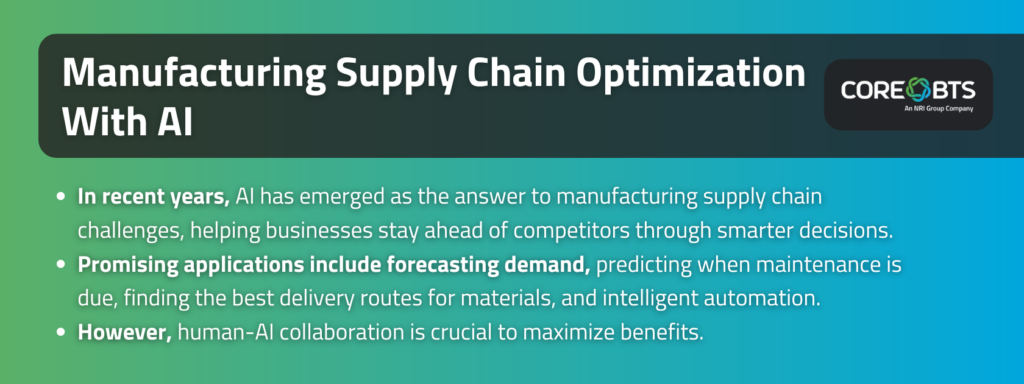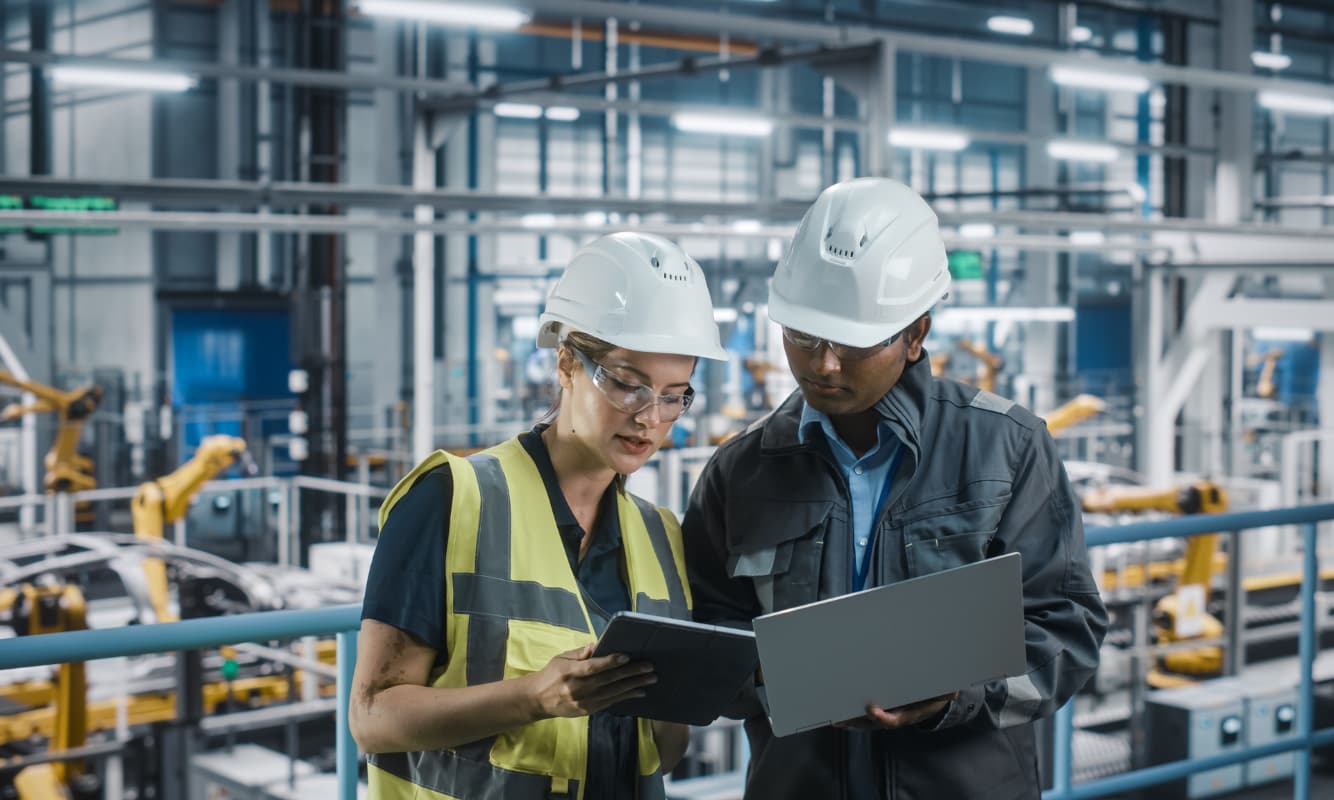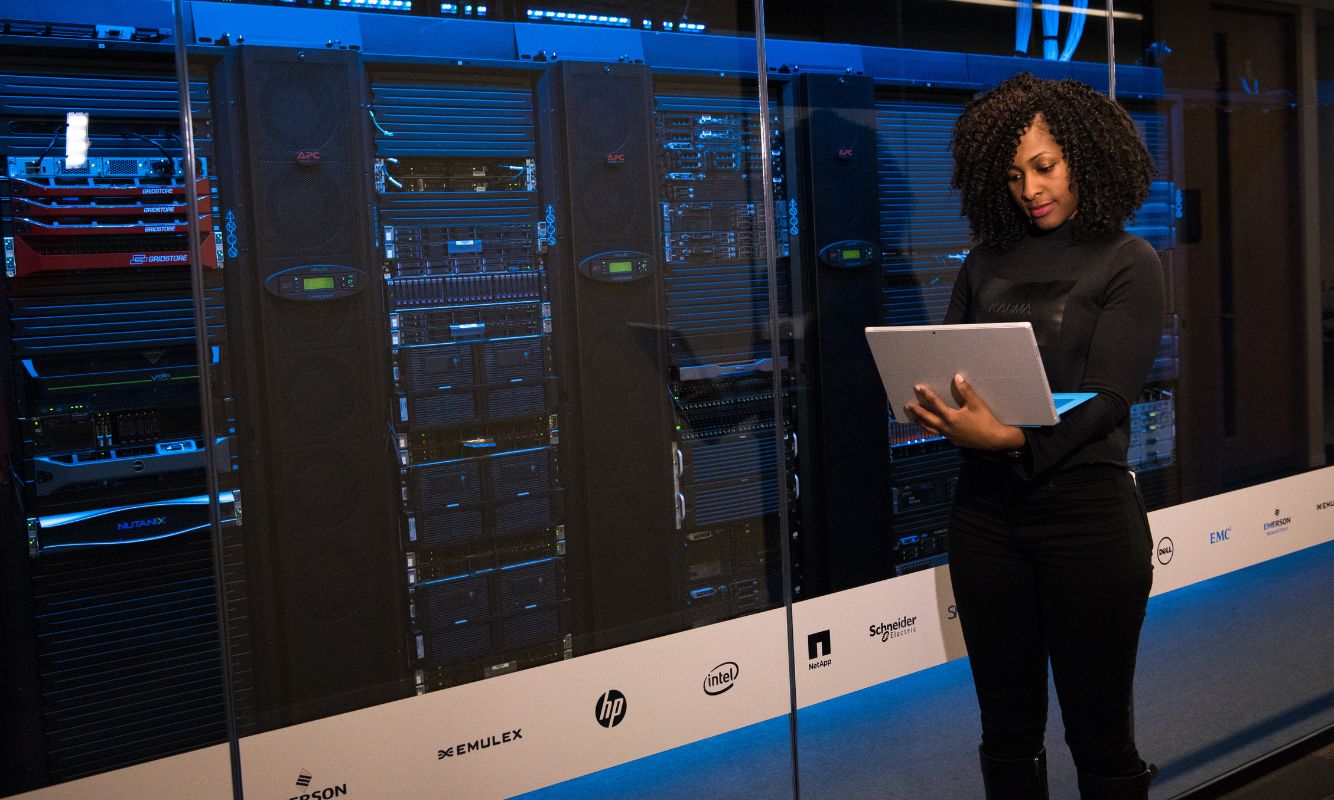AI is transforming manufacturing supply chains, optimizing every stage, from inventory management to logistics. Discover how to leverage it for enhanced efficiency and cost reduction.

The modern manufacturing supply chain isn’t what it used to be.
Manufacturers face unprecedented uncertainty and complexity in coordinating and managing their supply chain due to transportation delays, disruptions, demand fluctuations, and other factors.
At the same time, a revolution is taking place. Massive digitization over the last few years has created vast information across the supply chain, and manufacturers have kept up by using artificial intelligence’s (AI) ability to analyze data and identify patterns for informed decision-making.
The race towards AI-powered automation and intelligent supply chain management is underway. Organizations that don’t keep up will inevitably suffer, whether sooner or later. Therefore, it is crucial to get involved early.
Read on to discover areas where AI integration is changing the game for forward-thinking manufacturers and how to stay ahead of the curve with Core BTS.
Smarter Inventory Management
AI helps optimize inventory levels and reduce unnecessary costs in three ways:
1. Demand forecasting
Knowing exactly how much inventory is needed in the coming weeks, months, or years is game-changing intelligence as it allows you to proactively respond by adjusting supply chain operations, production schedules, and inventory levels.
With AI, that intelligence stays at your fingertips 24/7. You can analyze historical sales data, usage patterns, and market trends in real time to glean meaningful insights about what will happen in the future and take necessary measures to minimize costs and curb wastage.
2. Dynamic inventory planning
Optimum inventory management requires a complete understanding of what’s in stock when it will become obsolete or expire, where it’s needed, where it’s stored, how long it will take suppliers to fulfill orders, what the future demand looks like, and much more.
Your business likely uses inventory management software to bring all this information together. And that’s great!
AI simplifies inventory planning and makes the process more dynamic for airtight control. With it, you can merge all your data points (lead time, reorder points, etc.) with technical inputs and weigh them against demand forecasts and cash flow more confidently than ever to minimize excess inventory and stockouts.
Read more: How Core BTS Helped an Innovative Manufacturer Optimize Inventory Management.
3. Predictive maintenance
AI provides a comprehensive view of processes throughout the inventory management lifecycle, ensuring resources remain in optimal condition without disruption or deviation. You can quickly run audits to predict equipment failures on the supply chain and address root causes before problems arise.
Optimized Logistics With AI-Powered Insights
Promising AI applications in logistics and transportation include:
1. Route optimization
Route optimization using AI isn’t exactly new. We all use Google Maps to avoid motorways and tolls and find the shortest, most fuel-efficient routes when moving from one place to another. In manufacturing, you can take this a notch higher.
AI algorithms analyze real-time data from weather forecasts, GPS tracking, traffic sensors, and other sources to determine optimum routes. As a result, you can proactively avoid routes with congestion, accidents, closures, rain, snow, and other factors that may delay delivery, increase fuel costs, or compromise driver safety.
Caught in an unpredictable traffic jam? No problem. Just ask AI for alternative routes to keep delivery on schedule, and it does so instantly.
These are just a few examples of leveraging AI on the road.
2. Predictive analytics for logistics
Massive supply chain disruptions in the wake of the COVID-19 pandemic taught us all too well about the dramatic impact of uncertainties. Manufacturers must establish smart contingency plans to deal with uncertainties effectively.
Since AI provides end-to-end visibility of the supply chain, you can accurately predict all that could go wrong and implement robust measures ahead of time to mitigate them. You can also adjust contingency plans on the fly to prevent disruptions from escalating.
3. Autonomous vehicles and smart warehousing
Self-driving trucks, once regarded as the stuff of science fiction, are now on the road thanks to heavy investments and advancements in AI.
While still in early use, autonomous vehicles already handle short-haul delivery between logistics sites and warehouses. Many forward-thinking manufacturers also use them for long-haul transportation and last-mile delivery in congested areas.
Similarly, smart manufacturers are integrating AI into their warehouse management systems (WMS) to unlock new flexibility, accuracy, and efficiency levels. AI-powered WMSs enable everything from real-time monitoring of IoT devices and predictive inventory management to dynamic scheduling and efficient warehouse space utilization.
That said, you must leverage human expertise alongside AI to maximize benefits.
The Human-AI Collaboration Advantage
As AI models become more capable, manufacturers must remember that AI’s role is to complement human capabilities rather than replace them.
To stay competitive, it is essential to understand how AI can enhance the workforce’s strengths and how the workforce can effectively augment AI. Redesigning business processes to support human-AI collaboration is also crucial.
Broadly speaking, this means delegating data analysis and automation to AI while leveraging human decision-making and domain knowledge to interpret AI insights.
For best results, we recommend tapping skilled professionals to oversee AI implementation and leverage its potential.
Core BTS: Your Partner in AI-Powered Supply Chain Solutions
AI is relatively new and complex, so it’s understandable that even leading manufacturers get caught up in its implementation.
The benefits of adopting AI are often clear, but it’s never always immediately apparent how to optimize its use. Plus, even when you understand how to use AI, human resource and technology constraints may stand in the way.
In these scenarios, it makes sense to tap experts experienced in deploying AI in manufacturing to come in, roll up their sleeves, and do the work. Enter Core BTS.
At Core BTS, we’re helping forward-thinking manufacturers move from AI to ROI through human-centric solutions. We firmly believe that technology is only as impactful as it is usable, and we keep this top of mind at every step.
Our expertise includes:
- Identifying key areas for AI integration within supply chain networks.
- Developing and implementing custom AI solutions for demand forecasting, inventory management, and logistics optimization.
- Providing ongoing support and maintenance for AI-powered supply chain ecosystems.
- Ensuring data security and compliance with manufacturing regulations.
Regardless of your current status with AI implementation, Core BTS can deliver solutions that meet your business needs.
The Future of Manufacturing: A Symphony of AI and Human Expertise
Adopting AI will benefit manufacturers in the long run. Some examples are improving efficiency, reducing operational costs, making smarter decisions, enhancing their responsiveness to market demands, and increasing the agility and resilience of their supply chains.
However, before investing in AI, you must remember that unifying people, processes, and technology is the true way to unlock digital transformation.
That said, you can embrace the future by partnering with Core BTS. We’ll help you optimize the supply chain, future-proof operations, and stay competitive with AI.
Start with a custom AI readiness assessment to discover your AI maturity level and areas where you can unlock the most value.





Share on